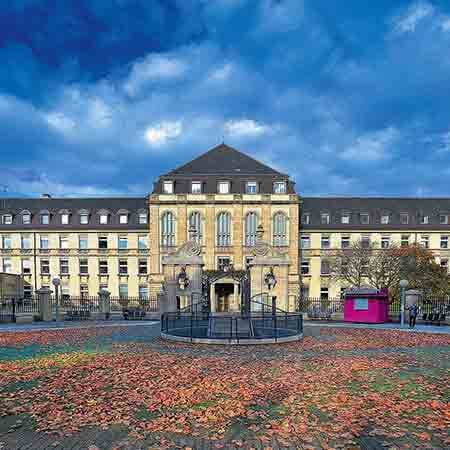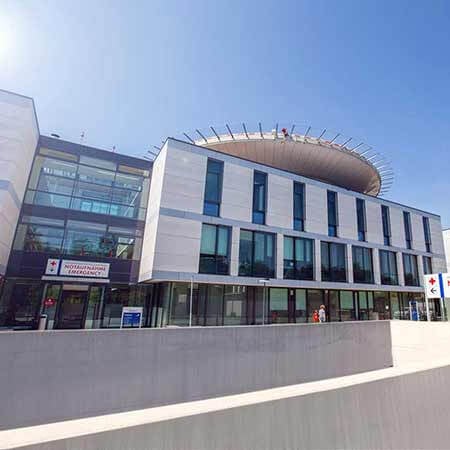Myeloid leukemia is a tumor that develops from hematopoietic cells. Cancer starts in the bone marrow and can then spread to the lymph nodes, spleen, liver, brain, or testicles. This disease is deadly, but it is successfully treated in developed countries. You can go abroad to receive high-quality medical services. Booking Health, a medical tourism provider, will help you to select the most suitable hospital and arrange your trip.
Content
- Chemotherapy
- Targeted therapy
- Other medications
- Radiation therapy
- Stem cell transplant
- Where to undergo myeloid leukemia treatment?
Acute myeloid leukemia (AML) is cancer that affects blood cells (granulocytes, monocytes).
Treatment of leukemia lasts several months and may be repeated, if necessary.
Depending on disease stage, treatment includes chemotherapy, targeted therapy and stem cells transplantation.
Cost of treatment with chemotherapy starts at €22,027. Price for bone marrow transplantation starts at €97,042. Cost of CAR T-cell therapy starts at €81,970.
Best hospitals in Europe are:
- University Hospital Rechts der Isar Munich
- University Hospital Frankfurt am Main
- University Hospital of Ludwig Maximilian University of Munich
- Helios Hospital Berlin-Buch
- Clinic of Advanced Biological Medicine Frankfurt am Main
Chemotherapy
The mainstay treatment of acute myeloblastic leukemia is chemotherapy. This is usually carried out in three consecutive stages:
Induction is an intensive treatment that lasts about one week. The task of doctors is to cleanse the blood of excess leukocytes and reduce the number of blasts in the bone marrow to normal indicators.
Consolidation is carried out after achieving remission. This is aimed at destroying the remaining small number of pathological cells. Chemotherapy is conducted in cycles. Each cycle is followed by a rest period so that the body can recover and cancer cells become more susceptible to the action of chemotherapy drugs.
Maintenance is a type of treatment when oncologists use low doses of drugs for months or even years after the completion of consolidation. A maintenance step is not required for all patients. This is most commonly used for acute promyelocytic leukemia but is not usually needed for other types of acute myeloid leukemia.
Most chemotherapy drugs are given intravenously. Less commonly, pills or subcutaneous injections are used.
Doctors conduct intrathecal chemotherapy if there are signs of the spread of myeloid leukemia to the central nervous system. The drugs are injected into the lumbar region, into the cerebrospinal fluid. If long-term therapy is required, doctors can implant an Ommaya reservoir in a patient. This requires a minor surgical procedure, during which a hole is drilled in the skull. A tube is inserted through it, which is constantly there. Later, a patient may avoid a painful lumbar puncture as the drugs are injected into the reservoir.
Targeted therapy
Targeted therapy is used in addition to chemotherapy and sometimes as a standalone method if chemotherapy does not work.
Drugs from the following pharmacological groups are used abroad:
- FLT3 inhibitors are used in adult patients if their cells have a mutation in the FLT3 gene;
- IDH inhibitors can be used in patients with mutations in their IDH1 or IDH2 genes. They block proteins, without which the maturation of pathological cells is impossible;
- Antibody-drug conjugates are a combination of chemotherapy agents and CD33 monoclonal antibodies, which are present in the leukemic cells of most patients. Monoclonal antibodies deliver drugs directly to cancer cells. They get inside, destroy these cells and block their division. These drugs can be used along with chemotherapy in a first-line therapy regimen. Sometimes they can be used instead of chemotherapy if it is contraindicated;
- BCL-2 inhibitors are often used in patients over 75 years with concomitant diseases of the internal organs. They block a protein that prolongs the life of cancer cells;
- Hedgehog pathway inhibitors are used in debilitated elderly patients as a safer alternative to systemic chemotherapy.
Other medications
In the case of myeloid leukemia, doctors use drugs that are neither chemotherapy nor targeted therapy.
All-trans retinoic acid (ATRA) is a form of vitamin A. This is included in the induction regimen, along with chemotherapy. The drug is safe and can also be used in the consolidation phase. Although the medication can sometimes cause side effects, patients' symptoms are not severe and resolve completely after therapy is completed.
Arsenic trioxide (ATO) can be used in the induction and consolidation phases, combined with ATRA, chemotherapy and targeted therapy. This affects the heart rhythm and therefore requires an ECG several times a week during the entire period of treatment.
Radiation therapy
Radiation therapy is rarely used for the treatment of myeloid leukemia. This is carried out only if clinically indicated:
- to suppress tumor foci outside the bone marrow, for example, in the brain or testicles;
- total body irradiation may be an adjunct to high-dose chemotherapy before a stem cell transplant;
- to relieve bone pain if chemotherapy does not help.
Doctors in developed countries use modern radiation therapy options, which help them to deliver the proper dose of radiation to the tumor more safely, with a minimum radiation exposure to the surrounding tissues.
Stem cell transplant
In severe cases, doctors resort to a stem cell transplant. This procedure can be:
- autologous, which involves the transplantation of the patient's own stem cells;
- allogeneic, during which doctors use donor stem cells.
The essence of the treatment is that doctors prescribe high doses of chemotherapy agents, sometimes combined with total body irradiation, to destroy all cancer cells. The bone marrow is also destroyed along with them. A patient is subsequently injected with stem cells, his own or donor ones, to restore it.
An allogeneic transplant is predominantly used for the treatment of myeloid leukemia, since an autologous one usually does not completely cure this disease. The problem is that the patient's own bone marrow already contains cancer cells, and after the transplant procedure, they will cause the disease recurrence. At the same time, the transplantation from a donor, although more dangerous, helps a person to cure a severe oncohematological disease once and for all.
The donor must be HLA (leukocyte antigen) compatible. It is better if it is a brother or a sister: the probability of a match is about 25%. If there is no suitable donor among the relatives, doctors will look for a suitable unrelated donor in their database. This may take several weeks or even months. The better the compatibility between the donor and the recipient, the greater the chance that stem cells will survive in the body and begin to perform a hematopoietic function.
If the transplantation is a success, an immune response "graft-versus-leukemia" develops. The renewed immunity better recognizes pathological cells and successfully attacks them.
However, this medal also has a downside. Some patients develop graft-versus-host disease. Their immunity begins to attack the body's own tissues, perceiving them as foreign. The better the compatibility of the donor and the recipient, the lower the risk of such complications. Nonetheless, even if such reactions develop, they can be controlled with drugs that suppress the immune system.
Doctors perform a mini-transplant procedure for older people who cannot tolerate a standard allogeneic transplant. This is also called non-myeloablative because high-dose chemotherapy does not completely suppress the bone marrow. After injecting donor stem cells, they exist for some time with the patient's own cells, but then they gradually replace them. The advantage of this approach is less toxicity of treatment. However, there is a risk that the donor cells will not survive in the bone marrow, so a mini-transplant is considered not a standard, but an alternative method of stem cell transplant. This can be used only for those patients who cannot endure the usual procedure due to their poor health.
Where to undergo myeloid leukemia treatment?
You can go abroad to undergo myeloid leukemia treatment with modern techniques, safely, and with a good tolerability of therapy. The Booking Health website presents the best hospitals in the world. You can find the cost of treatment to select the most suitable medical care program. Our employees will help you to select a hospital that specializes in the treatment of oncohematological diseases and achieves the best results.
There are a few reasons for you to undergo your leukemia treatment abroad:
- successful treatment at any age: in children, young or elderly patients;
- most people abroad can recover from acute myeloid leukemia completely;
- new treatment regimens that have proven themselves in clinical trials;
- doctors carry out personalized targeted therapy, which is selected depending on the type of leukemia and genetic mutations in the cells;
- safe treatment regimens for patients over 75 years who are weakened by concomitant diseases;
- high-precision radiation therapy options that deliver radiation directly to the tumor, without significant damage to the surrounding healthy tissues;
- high-quality accompanying treatment to prevent or eliminate complications and get rid of the symptoms of leukemia;
- in severe cases, doctors can perform a stem cell transplant from a donor to cure even patients who do not respond well to standard drug therapy.
You are welcome to leave your request on the Booking Health website if you are considering treatment abroad. We will contact you within a few hours and advise you on all issues. The Booking Health specialists will fully arrange your trip. When making your treatment appointment through our service, the cost of treatment for you will be lower due to the lack of additional fees for foreign patients.
Authors:
The article was edited by medical experts, board-certified doctors Dr. Vadim Zhiliuk and Dr. Sergey Pashchenko. For the treatment of the conditions referred to in the article, you must consult a doctor; the information in the article is not intended for self-medication!
Sources:
Cancer Support Community
Canadian Cancer Society
Healthline










